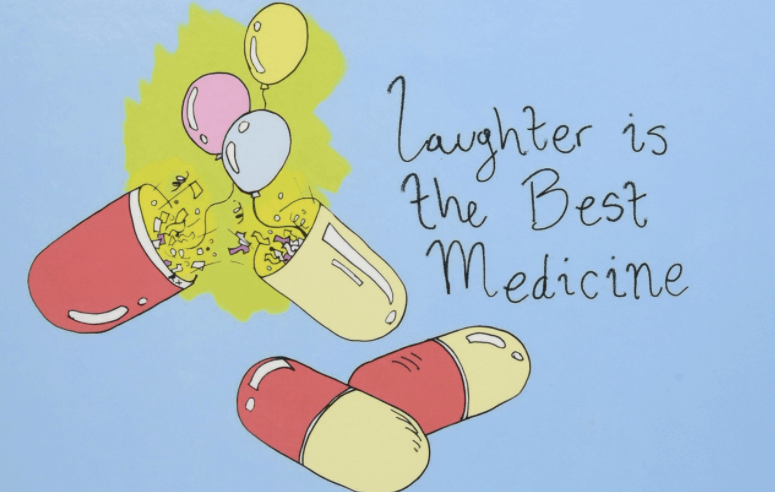Laughter as medicine: How to write good jokes about bad things

5 essentials of quarantine comedy.
COVID-19: Is it funny? No. Can you write jokes about it? Yes. DEPENDING. You need to be careful. Do it wrong, and you’ll bum people out (and/or, for one thing, be racist). But do it right, and you’ll do what comedy does: bring people together (even at 6 feet apart).
I have thought a lot about writing good jokes about bad things. I have struggled with PTSD since I was sexually assaulted as a teenager. I’m also a comedian—and I’ve talked about PTSD and assault on stage for years. Recently I recorded a podcast, hosted by two former soldiers who’d done tours in Afghanistan, where comedians talk about mental health. On the podcast, I half-joked, “The only people who get to talk about PTSD are soldiers and assault survivors.”
Obviously, that half-joke is not 100% true, but it does highlight a few crucial things to think about when you want to tackle the tough stuff. It might seem hard, but—take it from me, Hannah Gadsby, Cameron Esposito, Adrienne Truscott, Tig Notaro, Julia Sweeney, Maria Bamford, and many more, and their fans—it’s important, cathartic, empowering, and worth it. Big picture, joking about hard topics is a delicate process, but when done right it can accomplish something very special: make comedy important.
So! We are all stuck inside right now, but that doesn’t mean you have to leave your funny stuck inside, too. Since coronavirus is top of mind, I encourage you to rise to the challenge and explore where in this terrible situation you can find some true funny. Crack up your fam or just work on your craft—and let us know how it goes (@goldcomedy)!
Here’s how to get it right:
1. Keep it personal.
Ask yourself: Did this terrible thing happen to or affect me directly? The answer pretty much needs to be yes. Take: cancer. If you have struggled with it or someone close to you has, that makes it fair game for you. (Again: See Tig Notaro and Julia Sweeney, who have made true comic art about their own experiences with illness.) In the case of COVID, that test is easier to pass: We are all affected in one way or another by the social distancing, job loss, confusion, isolation, fear, etc. (not themselves funny, but all definitely a source of comedy).
I regularly make jokes about being a sexual assault survivor. So do other comics who are also survivors, and we always clap each other on. But when I see someone making a joke about sexual assault who is not a survivor, I get wary. It might turn out to be a good joke if it punches the right way (see below), but as a comic, it’s also your job to take care of your audience and not make them think they need to worry about how to respond to something. When Brett Kavanaugh was nominated to the Supreme Court, I had a joke about how “all” “Bretts” are rapists. During the setup, I made clear that as a survivor I was deeply affected by the hearings—and that helped audiences know it was going to be okay to laugh at whatever came next.
2. Punch in the right direction.
In comedy, you punch up. That is, you make the butt of the joke something or someone with more power than you. Avoiding punching down—making fun of people with less power than you—is incredibly important when you’re joking about sensitive topics. (Read more about punching up vs. punching down here.) In today’s terms: DON’T make fun of people or families suffering because of COVID. (DON’T make fun of Chinese people, or even China, for “starting the disease.” You might think it’s punching up because China is a country, but jokes like that usually rely on racism, which is always punching down.) DO (for example) make fun of powerful people you think are NOT HELPING (hilarious example from @Adley here), or—of course—of the ridiculous ways that YOU are responding to the experience of being stuck at home.
Making fun of yourself (punching the mirror?) is usually called self-deprecating comedy. A word of caution: You might lose the audience if they feel like you are beating yourself up too much. When I do jokes about my sexual assault on stage I don’t blame myself for getting assaulted or punch down at other survivors; I punch up towards the concept of assault, people who think it’s ok to hurt others, or the culture that allows such things to happen. This way, you’re talking about something specific to you—but everyone can relate.
3. Know your audience.
It’s always important to read the room (an actual room or whoever’s listening to/reading/etc. your jokes), but it’s most important when your topic might alienate or trigger members of your crowd.
Let’s say (rule 1, above) you’re making a joke about your struggle with a death in the family. You’re punching up (rule 2) by making the joke about the U.S. healthcare system. But the joke bombs. Why? Maybe your joke reminded too many people of someone they miss. Maybe your crowd thinks the healthcare system is awesome. No matter what: It happens.
Of course, bombing with material that is personal and difficult can hurt a lot more. I have a joke about when I told an ex-boyfriend I was a survivor. He said, “Like CSI,” and I said, “No, like SVU.” That joke works EVERY TIME, except…that one time. That one time made me feel worse than any other bomb in my life. Make sure you are ready to share these jokes, and try to find an audience that will support you.
4. Be open to (most) feedback.
Audience members (in real life or online) are often VERY HAPPY to share their opinions on your jokes. Maybe especially jokes about hard topics. When I started doing jokes about sexual assault, it was before #MeToo had reached full force. We weren’t talking as much about assault as a culture. I had a lot of male comedians tell me to stop. I had other comedians go on stage after me and riff at my expense with their own terrible “rape jokes.” Those…aren’t the opinions to be listening to.
DO: Listen to people who have been affected by the same bad things as you. If your joke is good, they will often be your biggest supporters. They will be much more valuable to your writing process than simply listening to those who say, “You can’t talk about that.”
5. Make sure YOU are ready.
Even if you follow all these steps, the most important thing about making these types of jokes is making sure you are ready. Not as a comedian, but as a person. These jokes are extremely personal if done right. You open yourself up on stage with these jokes—and that is hard. Some wounds are just too fresh for jokes, so don’t push or rush yourself. Not everything in your life has to be fodder for performance. Once you are ready, don’t be discouraged, if you stick to your story in a respectful and thoughtful way, no one can tell you you’re wrong.
Rosa Escandón is a New York-based writer and comedian. She’s been seen on Buzzfeed Video, DAZN, Seriously.TV, and other silly internet videos that you can watch here. She is a contributor to Forbes and has been an editor at the Tusk and a writer for Laughspin.
Rosa has served on the board of Cinder Block Comedy Festival and is a proud alumna of Bloomers: All Female Sketch Comedy. She joined the board of the Black Women in Comedy Festival for its inaugural year. She is a member of the sketch troupe Infinite Sketch.
